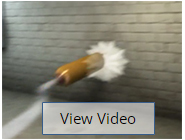Policy Key Points

Danger of Compressed Gas Video
Policy
Introduction
Compressed gas cylinders can be dangerous, if not handled properly. Because of the hazards of compressed gasses, it’s very important to know what associates are working with, what its hazardous properties are and how to safely handle its container-the compressed gas cylinder.
Moving, Use, and Storage
- Store and use cylinders in an upright position. Compressed gas cylinders shall be secured with chain or specialized safety straps to prevent being knocked over.
- When not in use, the metal cap shall remain in place to protect the valve. A blow to an unprotected valve might cause the gas under high pressure to escape. A damaged valve can turn a compressed gas cylinder into a missile-like projectile.
- Oxygen cylinders must be stored more than 20 feet from cylinders that contain flammable gases or other highly combustible materials. If they must be stored closer, cylinders should be separated by a fire resistant partition at least 5-feet high, having a fire resistance rating of at least one-half hour.
- Do not permit sparks, molten metal, electric current, excessive heat or flames to come into contact with the cylinders or attachments.
- Never use oil or grease as a lubricant on valves or attachments of oxygen cylinders. Keep oxygen cylinders and fittings away from oil and grease, and do not handle such cylinders or apparatus with oily hands, gloves or clothing.
- Never use oxygen as a substitute for compressed air.
- Never bring cylinders into tanks, unventilated rooms, or other close quarters.
- Never use cylinders without proper regulators.
- Cylinders must be moved only by a suitable hand truck or cart designed for sylinders. Rolling, dragging, or sliding cylinders is prohibited.
- Where cylinders must be handled by a crane, place them into a cradle and take extreme care not to drop or bump them.
- LP-Gas cylinders must be stored and used upright upon firm foundations or otherwise firmly secured.
- Piping connections to LP-Gas Cylinders should be sufficiently flexible to minimize the possibility of breakage or leaking of connections if the container settles, moves, or is otherwise displaced.
- When damage to LP-Gas systems by vehicular traffic is a possibility, precautions against such damage must be taken.
- Storage of LP-Gas cylinders in Yaskawa buildings is prohibited.
- LP-Gas containers and connections must be located to minimize exposure to high temperatures or physical damage.
- Never rely on the color of a cylinder to identify the gas. Content must be verified by the written label on the cylinder. If the label is missing or unreadable, do not use the cylinder.
- Before a regulator is connected, the valve should be opened slightly and closed immediately (cracked) to clear the opening of dust or dirt. Do not "crack" the valve of a flammable or toxic gas cylinder.
- Empty cylinders must have the valves closed, the caps replaced, and be clearly marked 'MT' or 'Empty' and stored separately from full cylinders.
Results of Breaches of Policy
Breaching this policy may result in an injury. Breaches of this policy may result in disciplinary action being initiated in accordance with Yaskawa America's discipline policy.
Training
All associates shall be provided with training related to this policy.
Revision History
| Rev # |
Description |
Release Date |
Approved by |
| 0 |
Conversion of old safety documents, rewrite, and issue |
4/11/2016 |
Thurwanger |
| 1 |
Added three bullet points: Never relying on cylinder color, the requirement to crack the valve, and marking of empty containers. |
2/11/2026 |
Thurwanger |
|
|
|
|
|
|
|
|
|
|
|
|
|
|
|
|
Program Review
| Review Date |
Reviewed by |
Changes Required (Yes/No) |
Revision # if updated |
| 2/15/2017 |
Thurwanger |
No |
|
| 1/10/2018 |
Thurwanger |
No |
|
| 1/17/2019 |
Thurwanger |
No |
|
| 1/9/2020 |
Thurwanger |
No |
|
| 1/19/2021 |
Thurwanger |
No |
|
| 1/13/2022 |
Thurwanger |
No |
|
| 1/26/2023 |
Thurwanger |
No |
|
| 1/11/2024 |
Thurwanger |
No |
|
| 1/16/2025 |
Thurwanger |
No |
|
| 2/11/2026 |
Thurwanger |
Yes |
1 |
